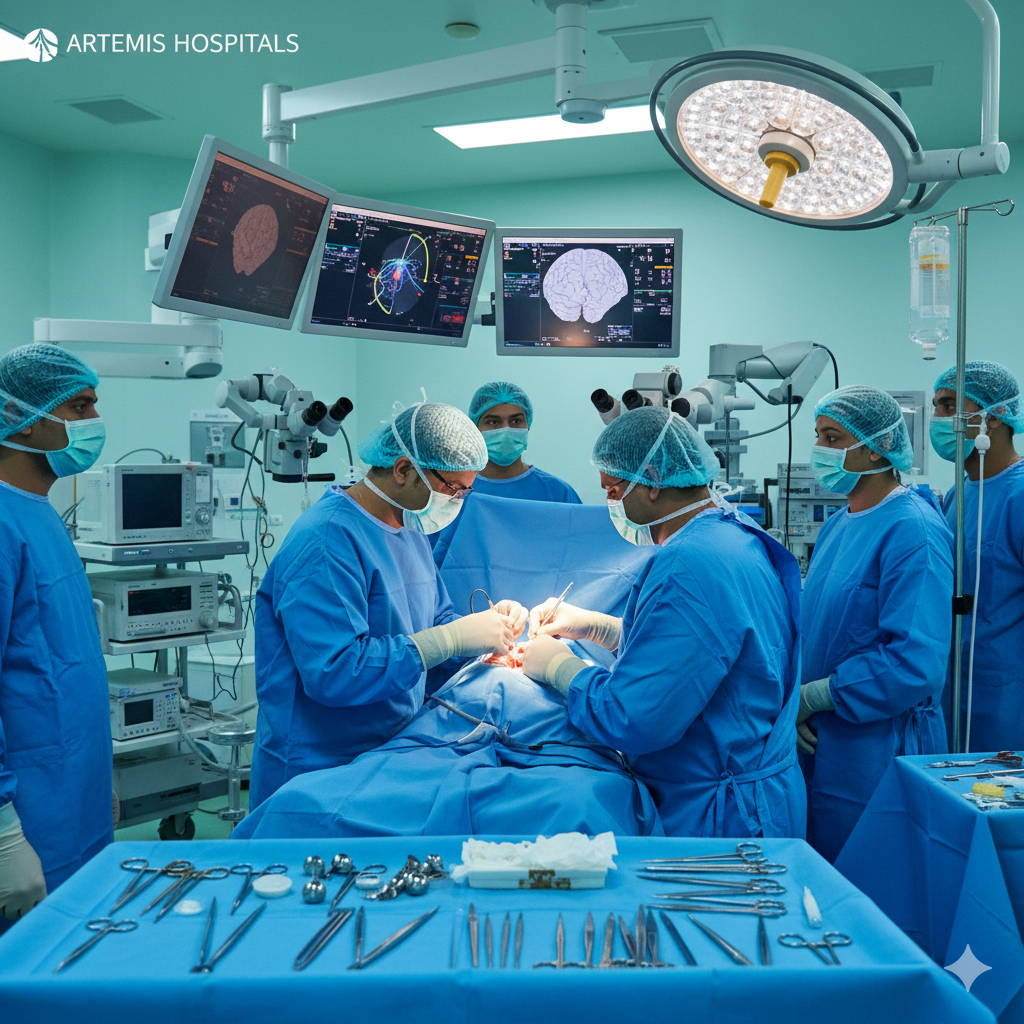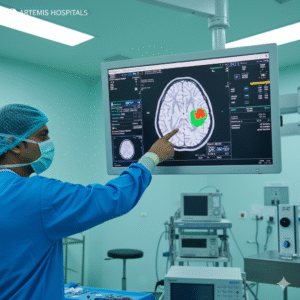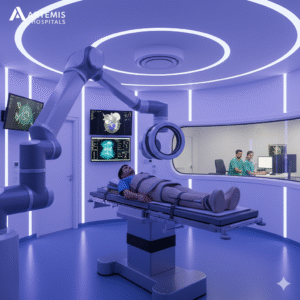

Hearing the words “You have a brain tumor” can be one of the most life-altering moments for any patient. However, with modern medical science and advanced neurosurgical techniques, early detection and effective treatment are now highly achievable. Under the expert care of the Best brain tumor surgeon in India, patients today have greater hope, faster recovery, and a higher chance of complete cure.
At Artemis Hospital, Gurgaon, Dr. Aditya Gupta, Chairperson – Neurosurgery & CNS Radiosurgery & Co-Chief – CyberKnife Centre, is recognized as one of the Best brain tumor surgeons in India, known for his expertise in treating complex brain tumors using minimally invasive and robotic radiosurgery methods. Patients from across India and abroad trust his team for world-class outcomes and compassionate care.
This article explores how brain tumors are detected, diagnosed, and treated — and why consulting the Best brain tumor surgeon in Delhi NCR or Gurgaon can make a life-changing difference.
What Is a Brain Tumor?
A brain tumor is an abnormal mass of tissue in which cells grow uncontrollably, disrupting normal brain function. Tumors can be either benign (non-cancerous) or malignant (cancerous). Even benign tumors can become dangerous if they grow near critical areas controlling movement, speech, or vision.
Common Types of Brain Tumors
-
Gliomas: Originate from the brain’s supportive glial cells; often aggressive.
-
Meningiomas: Develop from the brain’s protective covering; mostly benign.
-
Pituitary Adenomas: Affect hormonal balance.
-
Medulloblastomas: Common in children and young adults.
-
Acoustic Neuromas: Affect hearing and balance.
When and How Brain Tumors Develop
Brain tumors can develop at any age. While genetic factors may play a role in some cases, most brain tumors occur sporadically.
-
Children and teenagers may develop medulloblastomas or astrocytomas.
-
Adults often present with meningiomas or gliomas.
-
Elderly patients are more likely to be diagnosed with glioblastomas.
Exposure to radiation, family history, or certain genetic mutations can increase risk. Yet in most patients, the exact cause remains unclear. The key lies in early detection, which significantly improves treatment success.
Early Signs and Symptoms
Brain tumors often show subtle or misleading symptoms, which can delay diagnosis. Recognizing these early warning signs can save lives:
-
Persistent headaches, often worse in the morning
-
Blurred or double vision
-
Speech or comprehension difficulties
-
Weakness or numbness in limbs
-
Seizures without prior history
-
Loss of balance or coordination
-
Personality, mood, or memory changes
-
Persistent nausea or vomiting
If these symptoms continue or worsen, consult a neurologist or neurosurgeon immediately. Dr. Aditya Gupta, among the Best brain tumor surgeons in Delhi NCR, emphasizes that “timely diagnosis can turn a complex condition into a completely treatable one.”
Diagnostic Methods for Brain Tumors

Accurate diagnosis is essential before starting any treatment. The Best brain tumor surgeons in Gurgaon use advanced imaging and molecular testing to map the tumor precisely.
1. MRI Scan
MRI provides a detailed 3D view of the brain, revealing the tumor’s size, type, and location. Functional MRI (fMRI) further helps identify critical areas of brain activity during planning.
2. CT Scan
Often used in emergencies to detect bleeding or swelling associated with the tumor.
3. PET-CT Scan
This advanced imaging technique measures the tumor’s metabolic activity, distinguishing active cancer cells from dormant ones.
4. Biopsy and Molecular Testing
A small tissue sample may be taken for lab analysis. Genetic and molecular testing helps the Best brain tumor surgeon in India customize the treatment based on the tumor’s biological behavior.
Treatment Options for Brain Tumors
Treatment for brain tumors depends on multiple factors — the tumor’s type, location, size, and the patient’s overall health. At Artemis Hospital, patients receive an individualized, multi-disciplinary treatment plan led by Dr. Aditya Gupta, who is known as one of the Top brain tumor surgeons in India.
1. Surgical Management
Surgery is often the first step toward removing or reducing the tumor. Advanced neurosurgical tools enable precise removal with minimal damage to healthy brain tissue.
Techniques include:
-
Neuronavigation-guided microsurgery for real-time accuracy
-
Intraoperative MRI to confirm complete tumor removal
-
Awake brain surgery for tumors near speech or motor areas
-
Endoscopic skull base surgery for minimally invasive access
The goal is to maximize tumor removal while preserving critical neurological functions such as speech, movement, and memory.
2. CyberKnife Radiosurgery
For patients not suitable for open surgery, CyberKnife Radiosurgery offers a non-invasive, painless, and highly effective alternative.
This cutting-edge technology uses focused beams of radiation to destroy tumor cells while sparing surrounding healthy tissue.
Key benefits include:
-
No incisions or stitches
-
Outpatient procedure (30–90 minutes)
-
No anesthesia or hospital stay
-
Fast recovery and immediate return to normal life
Many patients treated with CyberKnife by the Best brain tumor surgeon in Gurgaon resume their daily activities within days — a revolution in patient comfort and convenience.
3. Radiotherapy and Chemotherapy
For malignant tumors like glioblastomas, radiation and chemotherapy remain key components of treatment.
-
Radiation therapy uses high-energy rays to eliminate residual cancer cells.
-
Chemotherapy or targeted therapy may be prescribed to prevent recurrence.
-
Immunotherapy, a newer approach, harnesses the body’s immune system to fight tumor cells more effectively.
Benign vs. Malignant Brain Tumors
| Type | Nature | Examples | Treatment |
|---|---|---|---|
| Benign | Non-cancerous, slow-growing | Meningioma, Pituitary adenoma | Usually cured with surgery or CyberKnife |
| Malignant | Cancerous, aggressive | Glioblastoma, Anaplastic astrocytoma | Combination of surgery, radiation, and chemotherapy |
Even benign tumors can cause severe problems if they press on vital brain structures — hence early consultation with the Best brain tumor surgeon in Delhi NCR is critical.
Is a Brain Tumor Life-Threatening?
Not always. The danger depends on the tumor’s location, size, and behavior. With modern tools, even previously “inoperable” tumors can now be treated safely.
Thanks to technological innovations like CyberKnife, intraoperative MRI, and awake surgery, the Best brain tumor surgeons in India have achieved exceptional success rates. Many patients who once faced hopeless diagnoses are now living long, healthy, and productive lives.

Recovery and Rehabilitation
Recovery after brain tumor treatment focuses on both physical healing and emotional well-being.
Post-Surgery Rehabilitation
Patients may experience fatigue or mild weakness initially. With the help of physiotherapists, speech therapists, and occupational experts, recovery is accelerated.
Psychological and Emotional Healing
A brain tumor diagnosis can be mentally exhausting. Counseling, meditation, and support groups help patients rebuild confidence and maintain a positive mindset.
Lifestyle Adjustments
-
Maintain a balanced diet rich in nutrients
-
Get regular exercise and sufficient sleep
-
Avoid smoking and alcohol
-
Manage stress with yoga or mindfulness
Regular Follow-Up
Periodic MRI scans and consultations are essential to monitor progress and ensure no recurrence. Patients treated with CyberKnife Radiosurgery often enjoy a faster return to normal activities with minimal follow-up interventions.
When Should You Consult a Neurosurgeon?
Seek immediate medical advice if you experience:
-
Persistent headaches not relieved by medication
-
Sudden seizures or fainting spells
-
Unexplained weakness or speech difficulty
-
Vision or hearing loss
Consulting an expert like the Best brain tumor surgeon in India ensures timely diagnosis and advanced care, improving both outcomes and survival rates.
Conclusion
Brain tumors are serious but treatable when managed by experts. With early detection, advanced diagnostic imaging, and minimally invasive techniques, outcomes are better than ever.
Under the guidance of Dr. Aditya Gupta, the Best brain tumor surgeon in India, patients receive cutting-edge care through a combination of surgery, CyberKnife radiosurgery, and precision-based treatment plans. Whether you are in Delhi NCR or Gurgaon, Artemis Hospital stands as a beacon of hope for brain tumor patients — where advanced science meets compassionate healing.
- Tags:
- Artemis Hospital brain tumor surgeon
- Awake brain surgery expert India
- Best brain tumor doctor in India
- Best brain tumor surgeon in Delhi NCR
- Best brain tumor surgeon in Gurgaon
- Best brain tumor surgeon in India
- Best brain tumor surgeon reviews India
- Best hospital for brain tumor in Gurgaon
- Best neurosurgeon for brain tumor in Delhi
- Best neurosurgeon for brain tumor India
- Brain tumor diagnosis MRI Gurgaon
- Brain tumor recovery rehabilitation India
- Brain tumor specialist in Gurgaon
- Brain tumor surgeon Delhi NCR
- Brain tumor surgeon Gurgaon
- Brain tumor surgeon India
- Brain tumor surgery cost India
- Brain tumor surgery Gurgaon
- Brain tumor treatment CyberKnife Gurgaon
- CyberKnife brain tumor surgeon India
- Dr. Aditya Gupta brain tumor surgeon
- Glioblastoma surgeon India
- Minimally invasive brain tumor surgery India
- Neuronavigation brain tumor surgery India
- Pediatric brain tumor surgeon India
- Pituitary tumor surgeon India
- Top brain tumor surgeon in Delhi
- Top brain tumor surgeon in Gurgaon
- Top brain tumor surgeon in India
- Top brain tumor surgeons list India




